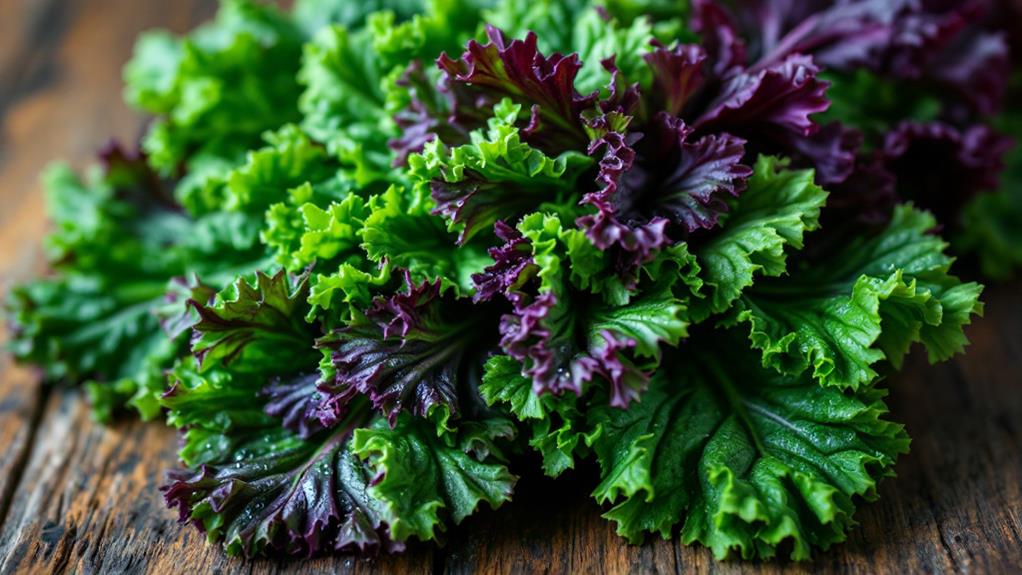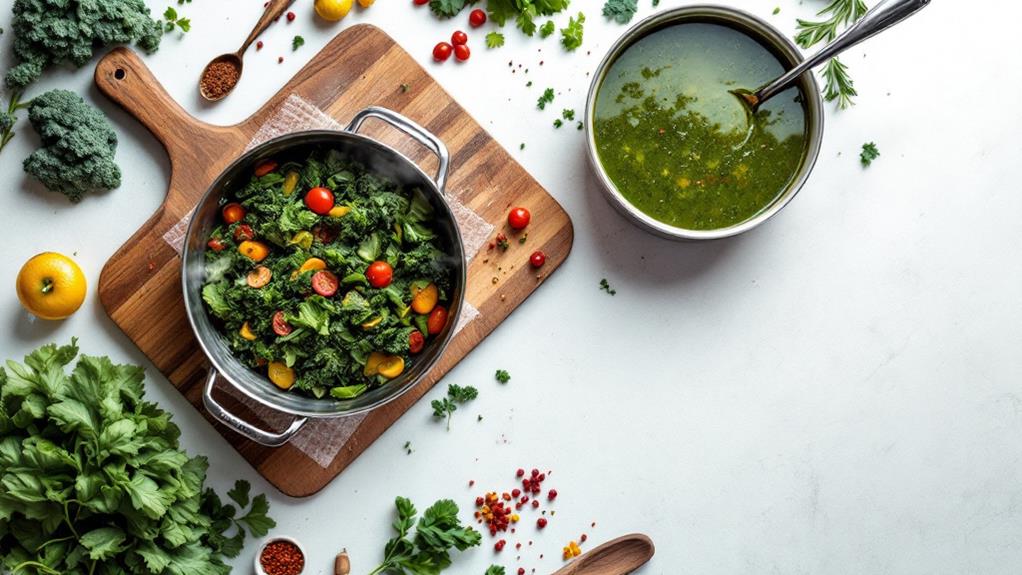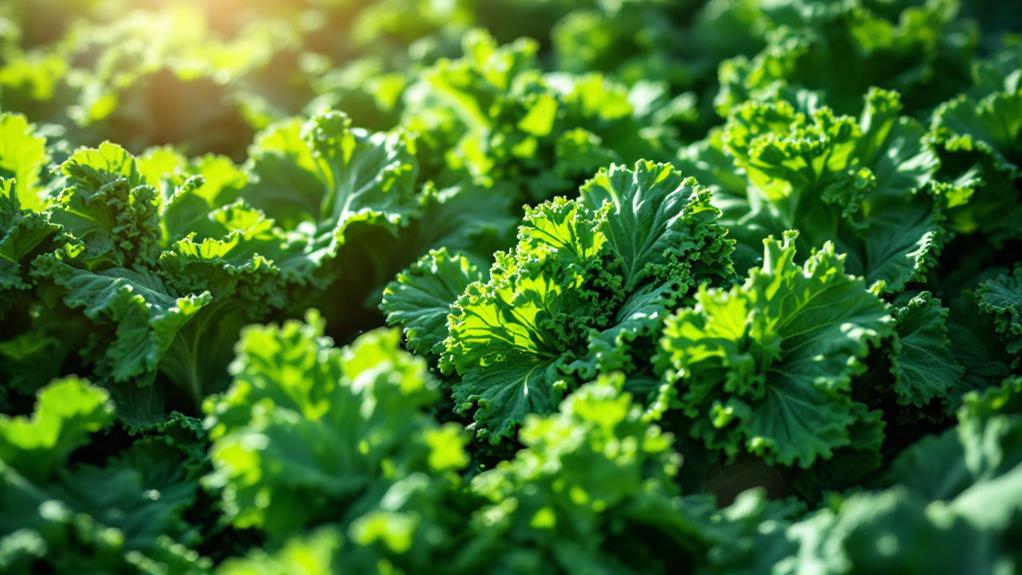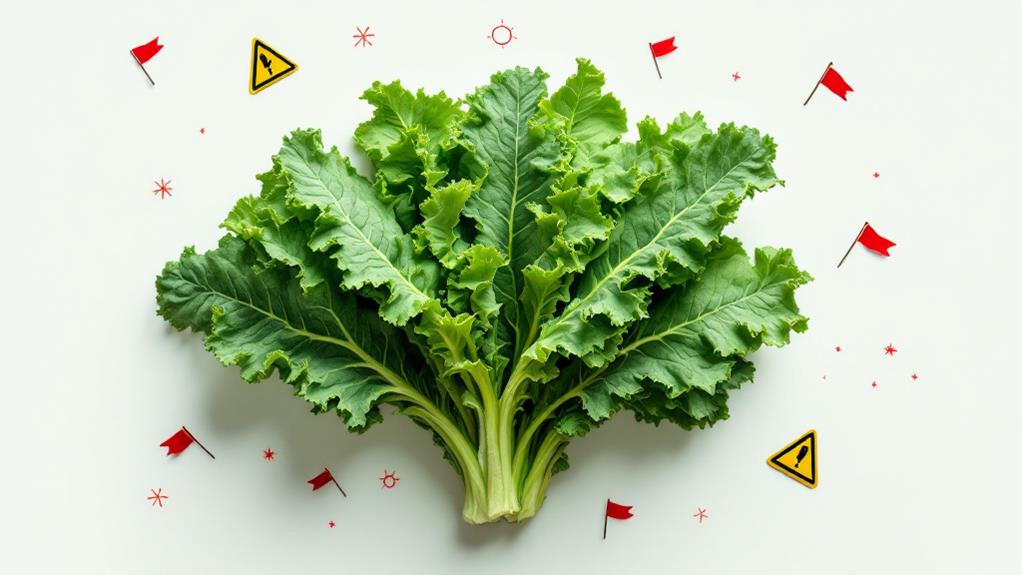A Complete Guide to Kale: Health Benefits and Nutritional Value

Kale is a nutrient powerhouse you should consider adding to your diet. It's packed with vitamins A, C, and K, contributing to strong bones, immune support, and skin health. With just 49.4 calories per cup when cooked, it's a low-calorie way to get 5.72 grams of fiber, promoting good digestion. Its high potassium content supports heart health by regulating blood pressure. Antioxidants in kale like quercetin combat inflammation and oxidative stress, potentially reducing cancer risk. Remember to wash it well due to possible pesticide contamination. As you investigate more, you'll find even more reasons to love kale.
Nutritional Profile
Kale's nutritional profile is impressive, making it a standout in the world of leafy greens. When you explore its benefits, you'll find that kale is a powerhouse of important nutrients. It's a low-calorie food, with just 49.4 kcal per cup of cooked kale, yet it's packed with vitamins and minerals. Among its standout features is its vitamin content—providing over 100% of your daily value for vitamin K. This is critical for blood clotting and bone health. Moreover, it supplies 22% of vitamin A and a hefty 91.1 mg of vitamin C, supporting immune function and skin health.
In terms of fiber, kale doesn't disappoint. A cup of cooked kale offers about 5.72 grams of fiber, helping you reach the recommended daily intake of 22-34 grams, which is essential for digestive health. It's also an excellent source of calcium, delivering 354 mg per cup to help meet the daily requirement of 1,000-1,300 mg, supporting strong bones and teeth.
Kale's rich nutrient profile includes small amounts of important minerals like iron, potassium, and magnesium, along with antioxidants such as quercetin and kaempferol, known for their protective health benefits.
Health Benefits
Exploring kale's impressive nutritional profile naturally leads to its numerous health benefits. Kale stands out with its high vitamin K content, providing nearly 70% of your daily needs per raw cup. This vitamin is essential for maintaining strong bones and ensuring proper blood clotting. Regarding digestive health, kale's robust fiber content (5.72 g per cooked cup) aids in digestion, helps prevent constipation, and may lower the risk of type 2 diabetes.
Kale is also rich in powerful antioxidants like quercetin and kaempferol. These compounds help combat oxidative stress and inflammation, potentially reducing the risk of chronic diseases such as cancer and heart disease. Furthermore, a single cup of cooked kale delivers a substantial 91.1 mg of vitamin C, which plays an important role in immune function and skin health by promoting collagen production.
The potassium content in kale (485 mg per cooked cup) is another boon for your heart health. It supports heart health by regulating blood pressure and may help lower LDL cholesterol levels. With these health benefits in mind, incorporating kale into your diet can be a smart move for comprehensive wellness.
Culinary Uses

Kale offers numerous culinary possibilities, making it a versatile ingredient in any kitchen. Regardless of whether you're a fan of raw kale or prefer it cooked, kale leaves can increase the nutritional value of your meals without piling on the calories. One way to enjoy kale is by massaging the leaves to soften them for salads, which improves both flavor and digestibility. Raw kale also works wonders in smoothies, offering a healthy foods option that's packed with nutrients.
For those who prefer cooked kale, there are several preparation methods to take into account. You can sauté, steam, or roast kale to bring out its unique flavors. A popular choice is making kale chips—simply toss the leaves with olive oil and seasoning, then bake until crispy. This method transforms kale into a tasty, low-calorie snack.
When preparing kale for cooking, remove the tough middle rib to guarantee a better texture, especially in stir-fries and soups. Both curly kale and dinosaur kale can be used interchangeably in recipes, providing different textures and flavors. Incorporating kale into soups, casseroles, and pestos allows you to investigate versatile dishes while adding significant nutritional value.
Antioxidant Properties
Beyond its culinary versatility, this leafy green is packed with powerful antioxidants that can greatly improve your health. Kale is a nutrient powerhouse, rich in antioxidants like beta-carotene, vitamin C, flavonoids, and polyphenols. These antioxidants help neutralize free radicals, which are unstable molecules that cause oxidative stress and damage to your cells. This oxidative damage is linked to aging and numerous chronic diseases.
The significant levels of flavonoids such as quercetin and kaempferol in kale play an essential role in reducing inflammation. By doing so, they help lower the risk of chronic conditions and support your body's defense against oxidative stress. This can be particularly beneficial in cancer prevention, as kale contains compounds like sulforaphane and indole-3-carbinol, known for their anti-cancer properties.
One cup of cooked kale provides about 91.1 mg of vitamin C, enhancing its antioxidant power and supporting your immune function. Regularly consuming kale can lead to improved general health, reducing the risk of diseases like cardiovascular disease and cancer. By incorporating kale into your diet, you're investing in your long-term health, leveraging its antioxidant properties for a healthier future.
Heart Health

Your heart can greatly benefit from incorporating kale into your diet. Kale is a powerhouse in terms of heart health, offering a mix of nutrients that support cardiovascular function. It's rich in potassium, with a single cup providing 485 mg, which helps regulate blood pressure and may lower the risk of cardiovascular diseases. By maintaining healthy blood pressure levels, you're actively protecting your heart.
Dietary fiber in kale plays a vital role in reducing LDL cholesterol levels. Lowering LDL cholesterol is important for maintaining heart health and reducing the risk of heart-related issues. Studies have shown that consuming 14g of kale powder daily for eight weeks can notably reduce both LDL cholesterol and blood pressure, showcasing kale's effectiveness.
Kale's antioxidants, like quercetin and kaempferol, contribute to reduced inflammation and improved heart health markers. These antioxidants help keep your heart in top shape by combatting oxidative stress, a known contributor to cardiovascular diseases.
Additionally, kale contains omega-3 fatty acids, which further promote cardiovascular health by supporting heart function and reducing inflammation. By adding kale to your meals, you're actively investing in your heart's well-being, ensuring it stays strong and healthy.
Cancer Prevention
Packed with powerful compounds, kale stands out as a valuable ally in cancer prevention. As a cruciferous vegetable, kale boasts sulforaphane and indole-3-carbinol, which are known for their potential anti-cancer effects. These compounds bolster detoxification processes and may inhibit tumor growth, making them vital for a cancer prevention strategy. By incorporating kale into your diet, you're not just getting a tasty green but also harnessing significant health benefits.
Kale's high fiber content and phytonutrients also play an important role in reducing the risk of certain cancers, particularly colorectal cancer. Fiber supports digestive health, while phytonutrients contribute to general health by offering protective mechanisms against disease. Additionally, the antioxidants in kale, such as quercetin and kaempferol, combat oxidative stress, which is linked to cellular damage and cancer progression. By reducing oxidative stress, you help protect your cells from potential harm.
Incorporating kale regularly can improve your body's ability to eliminate carcinogens, supporting cancer prevention efforts. Although human data on kale's cancer-fighting properties varies, its nutrient-rich profile undeniably supports general health, potentially reducing cancer risk when included as part of a balanced diet.
Bone Health

Kale is an exceptional ally for bone health, offering a wealth of nutrients important for maintaining strong bones. Packed with vitamin K, kale provides nearly 70% of your daily needs per raw cup, which plays an essential role in bone metabolism and blood clotting. This leafy green is also a fantastic source of calcium, delivering 354 mg per cooked cup, helping you meet your daily requirements necessary for maintaining bone density and strength.
Incorporating kale into your diet can greatly reduce the risk of osteoporosis, a condition characterized by weakened bones and increased fracture risk. The magnesium in kale improves calcium absorption, further supporting bone health and helping you maintain robust bones. Regular dietary intake of kale guarantees you're getting these critical nutrients, promoting total bone density and reducing potential fractures.
Additionally, kale is rich in antioxidants like quercetin and kaempferol, which combat inflammation and oxidative stress, factors that can adversely affect bone health. By including kale in your meals, you'll not only enjoy its delicious taste but also strengthen your body's defenses against inflammation and support long-term bone health.
Skin and Hair
Rich in essential nutrients, kale offers numerous benefits for your skin and hair. It's packed with vitamin C, which is important for collagen production, helping you maintain skin elasticity and a comprehensive youthful appearance. By supporting collagen, vitamin C plays a considerable role in keeping your skin firm and resilient. The antioxidants in kale, such as quercetin and kaempferol, combat oxidative stress, shielding your skin from potential damage and reducing signs of aging and irritation. This antioxidant protection can lead to a more even skin tone and fewer wrinkles over time.
Kale is also abundant in vitamin A, important for promoting skin cell turnover and repair. This process helps keep your complexion clear and healthy. The omega-3 fatty acids present in kale improve skin hydration, contributing to a more resilient and well-moisturized skin barrier. With its anti-inflammatory properties, kale can reduce redness and irritation, leading to a smoother and more balanced appearance.
Incorporating kale into your diet can greatly improve your skin health. As for your hair, the nutrients found in kale guarantee your locks are strong and well-nourished, promoting comprehensive health and vibrancy.
Risks and Considerations

While kale offers remarkable benefits for your skin and hair, it's important to be aware of potential risks associated with its consumption. Kale ranks third for pesticide contamination, so thoroughly washing it before eating is essential to minimize your exposure to harmful chemicals. If you're on beta blockers, consume kale in moderation. Its high potassium content can lead to increased potassium levels, which might be risky. Likewise, if you have kidney disease, you should limit kale intake to avoid complications linked to excess potassium in your body.
Furthermore, kale's high vitamin K content can interfere with blood thinners like warfarin. If you're on such medication, consult with your healthcare provider before making any significant dietary changes involving kale. While it's a nutritious inclusion to your diet, excessive consumption of kale can pose risks. Balancing it with a variety of other foods is important to maintain general health and reap the full spectrum of kale's health benefits without adverse effects. Remember, incorporating kale into your meals should improve your diet, not complicate it, so always consider moderation and individual health conditions when adding kale to your plate.




